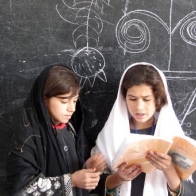H.E. Mohammad Ashraf Ghani, President of Afghanistan, called for an improvement of quality in education by creating a tangible linkage between education and the economic and social development of the country. A forward-looking curriculum comprising instructional materials and teaching and learning strategies is required to contribute to the country’s development goals. The Afghan Ministry of Education has strategized to conduct a needs assessment and a comprehensive review of the existing curriculum that could prepare the basis for the development of a Curriculum Reform Plan. The comprehensive plan will lay the foundations for strengthened linkages between Afghanistan’s school curriculum, its national economic development, and improved employment and development opportunities for its youth. The curriculum should also be based on broad-based discussions that establish common understandings, ownership as well as strong political and social commitment and support.
Upon request from the MoE and as UNESCO’s institute specialized in curriculum, learning, teaching and assessment, the International Bureau of Education (IBE) is collaborating with the UNESCO Office in Kabul to provide technical support in conducting the needs assessment, reviewing the existing curriculum, and contributing to the elaboratation of the Curriculum Reform Plan. The IBE intervention is guided by the idea that through a well-designed curriculum, the education system can support inclusive, fair and sustainable development.
A preliminary situational analyses of the current national curriculum’s strengths and weaknesses, as well as the issues and challenges to be addressed, have enabled the identification of the major areas for the intended reform, including:
• At the official curriculum level – revising current curriculum framework and textbooks; shortening the number of school subjects; strengthening vocational preparation; developing a national student assessment policy;
• At the implemented curriculum level – guaranteeing the prescribed school time; improving teacher education and teacher professional development; revising teacher education curriculum and guide books; developing capacities at large;
• At the curriculum processes level – engaging more stakeholders; improving coherence between education sub-sectors; developing a curriculum evaluation strategy.
During a field visit (12-16 March 2016), the IBE will conduct policy and technical consultations with MoE staff and other stakeholders, gather feedbacks, and share curriculum reform proposals/experiences from other countries. Based on the draft curriculum proposal, all stakeholders will provide inputs to further discuss and validate the intended curriculum reform proposal.

